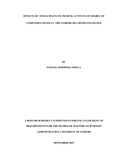| dc.description.abstract | Stock splits remain the most popular and least understood phenomena in equity markets (Njagi, 2010). That is why investors and borrowers are always concerned about the returns of stocks and thus seek to know the behavior of stock prices (Kothari and Warner, 2004). The Nairobi Securities Exchange in particular has been experiencing a noteworthy bullish market since 2000 with securities across all counters recording an upward trend in stock prices (Mbugua, 2004). Despite this optimistic view, it is still unclear why stock splits are necessary since there is no bound limiting stocks price level thus alternative signaling devices such as dividend increases are used to in a wide ranging way. A number of studies have been done regarding stock splits. However there is no rich literature available on the effect of stock splits on trading activities at the NSE. This shows that limited attention has been paid to the effect of stock splits on trading activities of companies. Thus, this study sought to fill this existing knowledge gap. The study adopted an event study of a descriptive nature. The target population of the study comprised 13 equity listed companies that have announced stock splits at the NSE between 2005 – 2014. Secondary data was obtained from the NSE handbook and also from the companies‟ daily trading activities at the NSE. The event methodology was used to evaluate the abnormal share price reaction of the corporate announcements of stock splits. The study findings indicated that there were no abnormal significant shares traded on the announcement dates, but there was significant trading within the range of ±5 days before and after announcement dates and finally no significant trading volumes within the ±15 days.The study found that stock splits are motivated by stock price movement and consequent low stock liquidity in the market. The study found that stock split announcements cause a general increase in trading activities of stocks. The effect of stock splits announcements on trading activity persists for an average period of one month. Stock split announcements affect trading activity almost immediately. | en_US |

